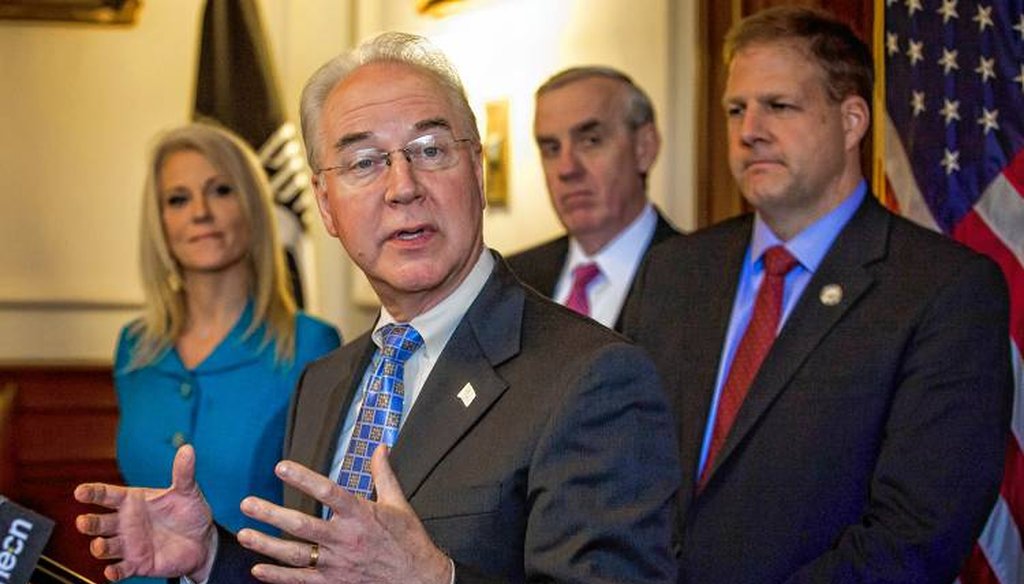

Our only agenda is to publish the truth so you can be an informed participant in democracy.
We need your help.


U.S. Health and Human Services Secretary Tom Price attends a press conference at the State House in Concord on Wednesday, May 10, 2017, following a meeting with local officials and community members about the opioid crisis. (ELIZABETH FRANTZ / Monitor sta
President Donald Trump has made a lot of promises to solve the country’s opioid crisis, which killed over 33,000 people in 2015 alone.
They included the pledge to build a wall on the southern border to stop the flow of drugs from Mexico and Latin America and more money to accelerate new treatment and prevention programs.
Secretary for the Department of Health and Human Services Tom Price and Counselor to the president Kellyanne Conway reiterated Trump’s commitment to end the opioid crisis this month, as they visited New Hampshire - a state that has been one of the hardest hit by drug deaths.
Their visit came a week after it was announced that the Trump administration had been planning to gut the Office of National Drug Control Policy, slashing the long-running agency's budget by $364 million, or about 95 percent, in its proposed budget. As it turned out, they did not go through with such a steep cut in Trump’s final budget.
Asked about the proposed cuts, Price said, "I think if you look at the entire federal government and the president’s commitment to this challenge, you’ll see that there are actually hundreds of millions of dollars increase on this issue."
But do Trump’s proposals mesh with Price’s statements about increasing money for treatment, prevention and recovery?
Crunching the numbers
To get some clarity, we reached out to the Department of Health and Human Services to get a numbers breakdown.
A spokesman for HHS responded, pointing to funding in the Congressional omnibus bill, the temporary spending measure to keep the government running that was passed in early May.
"At minimum, the Omnibus provides $213 million in new funding to combat the opioid epidemic across the federal government," Alleigh Marre said. "With all that in mind, the Secretary’s comment that there is a ‘hundreds of millions of dollars increase’ across the federal government, is true."
However, that number includes money that was passed by Congress in 2016, before Trump was president, and doesn’t account for the president’s proposed federal budget.
Here’s the breakdown of what’s in that number:
$500 million in 21st Century Cures Act grant money, which was passed by Congress under President Obama.
$150 million as part of the 2017 omnibus, which includes money for the Substance Abuse and Mental Health Services Administration, Centers for Disease Control and Health Resources and Services Administration to fight addiction.
Marre also highlighted $12.5 million in funding for four new heroin enforcement groups within the DEA and $50 million to the U.S. Department of Veterans Affairs to fund opioid and substance abuse prevention and treatment programs.
But since Price cited Trump’s commitment to combat the opioid crisis, it’s important to note what money was approved before he took office.
Budget and health care bill
Beyond these budget increases, however, experts on addiction and recovery say that other proposals by Trump won’t help ease the opioid crisis and could actually make it worse.
His budget is asking for almost $400 million in cuts to the Substance Abuse and Mental Health Services Administration, which could result in fewer mental health block grants being distributed.
And the recently proposed Republican health care bill, which Trump supports, proposes drastic cuts to Medicaid. The House bill calls for $800 billion of cuts to Medicaid in 10 years, on top of the $610 billion cut to Medicaid benefits sought in Trump’s budget. That means Medicaid spending could be cut by 45 percent in 10 years.
This has serious implications for people who get health insurance through expanded Medicaid in New Hampshire and elsewhere, many of whom get mental health treatment and substance abuse coverage paid.
And that has many treatment advocates in New Hampshire worried.
"We need a system of response that includes access to treatment, recovery, and also, we have to address the supply side through supporting law enforcement in their work. I’m not seeing evidence that that’s actually happening," said Linda Saunders Paquette, director of treatment advocacy organization New Futures.
It’s worth noting that the president’s budget is just a blueprint; members of Congress have said they are unlikely to approve the spending plan as written.
Our Ruling
Citing Trump’s commitment to fight the country’s opioid crisis, Price said the government is already spending "hundreds of millions of dollars" more to that end.
More funding was approved in the recent Congressional omnibus bill to keep the government running, but other policies he’s seeking to pursue -- notably cuts to Medicaid -- could wipe out that increase and then some. We rate the claim Half True.
Email statement from Alleigh Marre, spokesman Department of Health and Human Services
Vox, Trump’s budget makes it official: he’s doing little to nothing about the opioid epidemic, May 23, 2017
STAT, After outcry, Trump budget largely preserves ‘drug czar’ funding, MAY 23, 2017
Concord Monitor, Trump pledged to solve the opioid crisis, but is proposing to cut programs that combat it, May 9, 2017
In a world of wild talk and fake news, help us stand up for the facts.
